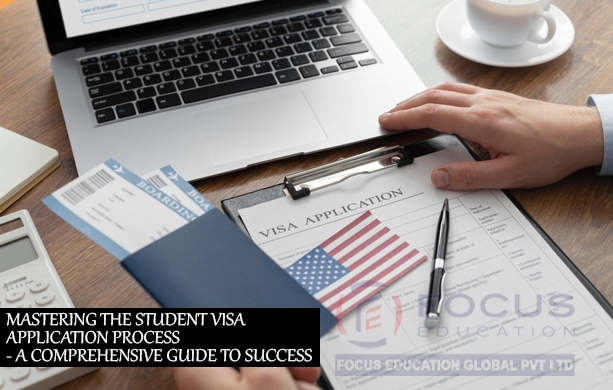Mastering the Student Visa Application Process - A Comprehensive Guide to Success
Navigating the Student Visa Application Process successfully is crucial for those planning to Study abroad. To prevent the disappointment of visa rejection, it’s necessary to understand common reasons for denials and take proactive steps to address them. This guide will provide valuable insights and practical tips to help aspirants navigate the student visa application process effectively, by increasing their chances of approval.
Common Reasons for Student Visa Rejection
1. Incomplete/ Inaccurate Documentation:
Submitting incomplete or inaccurate documentation is a prevalent reason for visa rejection. To meet specific visa requirements, one must ensure that all required forms, educational transcripts, language proficiency test results, and other supporting documents are appropriately filled out and are up to date.
2. Insufficient Financial Resources:
Inadequate proof of financial capability to cover tuition fees, living expenses, and related costs can lead to a rejection. It is crucial to demonstrate sufficient funds through bank statements, scholarship letters, sponsorship letters, or other documentation as required by visa authorities.
3. Lack of Genuine Intent:
Applicants can be rejected by the Visa Officers if they suspect the candidate’s intentions to study abroad are not genuine, or ulterior motives for permanent immigration or unauthorized work. There should be clear communication of genuine academic goals, career plans, and ties to the home country to address concerns.
4. Failure to Meet Health and Security Requirements:
Having a medical condition that poses a risk to public health or belonging to a criminal background may result in rejection. It is crucial to be compliant with health and security requirements along with medical or police clearance certificates.
5. Insufficient Academic Preparation:
Failure to meet the academic prerequisites of the chosen educational institution or program can lead to rejection. So, applicants’ academic background and qualifications should align with the requirements and provide evidence of educational qualifications.
6. Lack of Language Proficiency:
Failure to demonstrate sufficient proficiency in the language of instruction (eg: English) can lead to rejection. Hence, it is essential to take language proficiency tests, such as IELTS, and attain minimum language requirements.
7. Indiscipline During the Interview:
It is essential to maintain professionalism throughout the visa application and interview process. Behaving inappropriately or unprofessionally can negatively impact your application.
Tips to Avoid Student Visa Rejection
Visa Rejection can be extremely demoralizing; it’s better to be ready now rather than regretting it later. So, here are some useful advice to prevent the denial of a student visa.
1. Submit Application on Time:
Applying early increases approval chances, as visa officers face high application volumes during admission seasons. Late submissions carry a higher risk of rejection.
2. Double-Check Documents:
Ensuring all required documents are present and accurate is critical. Any missing or inaccurate information can lead to rejection.
3. Honesty and Confidence During the Interview:
Answering questions truthfully and confidently during interviews is important. Clearly explaining motivations for studying abroad and the intention to return home after studies is crucial.
4. Follow the Guidelines for SOP or Visa Letter:
Adhering to guidelines for writing the SOP or Visa Letter, structuring it appropriately, addressing required points, and proofreading carefully before submission is crucial.
Steps if student visa gets rejected
It can be discouraging if a student visa is denied, but some steps can be taken to address the situation
1. Evaluate Reasons for Rejection:
Review the rejection letter to understand specific reasons for the denial, this will help to identify areas for improvement in the next application.
2. Seek Professional Advice:
Consulting an experienced visa consultant for guidance and insights can be valuable. They can offer advice on strengthening the application based on their expertise.
3. Address the Issues:
Proactively address identified reasons for rejection, which may involve gathering additional documents, improving financial documentation, strengthening ties to the home country, or enhancing language skills.
4. Reapply with an Enhanced Application:
If reapplying, ensure issues leading to rejection are address. Thoroughly review the application, double-check documents, and provide any additional information or evidence which can strengthen the case.
5. Consider Alternative Study Options:
If facing multiple rejections for the same country, explore alternative study destinations with more favorable visa policies.
6. Maintain a Positive Attitude:
Stay positive, learn from the experience, make necessary improvements, and approach the next application with confidence.
Impact of Backlogs on Visa Applications
Backlogs, or unfinished or incomplete courses or subjects from prior academic years, may affect an application for a study abroad visa. It’s critical to comprehend the general consequences even though the precise consequences may differ based on the nation and immigration laws.
1. Delayed Processing:
Backlogs may result in delayed processing as immigration authorities take additional time to review academic standing and progress.
2. Evaluation of Academic Achievement:
Visa officers may closely examine academic records, requiring additional documentation or explanation to assess eligibility.
3. Financial Consequences:
Backlogs may affect eligibility for financial aid or scholarships with specific academic performance requirements.
4. Additional Documentation or Interview:
Severe backlogs may necessitate additional documentation or interviews to clarify the academic situation.
5. Closer Examining of Intent:
Visa Officers may pay closer attention to intentions and motivations, seeing reassurance of genuine commitment to studies and a clear plan for managing and resolving backlogs.
Note: Backlogs can raise concerns, they don’t guarantee visa rejection. Each case is assessed individually, considering factors such as overall academic records, reasons for backlogs, efforts to address them, and supporting documentation provided.
Tip: To increase the chances of a successful student visa approval, thorough planning, attention to detail, and adherence to guidelines are essential. Seeking professional guidance can also be beneficial in navigating the complexities of the visa application process.
Hence, implementing these strategies, understanding requirements, and seeking professional guidance, enhance the chances of a successful student visa application and embark on an educational journey abroad.
Please reach out to education experts at Focus Education Pvt Ltd for valuable support in navigating the successful visa application process. We provide support on IELTS Coaching, Admission Guidance (studying in the UK with or without IELTS), Interview Preparation, Document Lining, and visa process.



